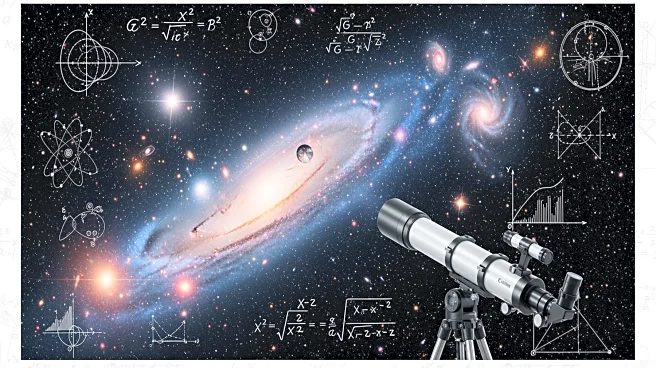What's Happening?
Astrophysicist Robin Cordet, a senior research scientist at the University of Maryland, Baltimore County, has proposed a new hypothesis to explain the Fermi paradox, which questions why humanity has not yet detected advanced alien civilizations despite
the high probability of their existence. Cordet's theory, termed 'radical mundanity,' suggests that alien civilizations may not be significantly more advanced than humans, leading to mutual detection limitations. This idea challenges more extreme theories that propose either the non-existence of aliens or their deliberate avoidance of Earth. Cordet's hypothesis posits that technological progress may have a natural limit, preventing civilizations from developing detectable technosignatures or from detecting others.
Why It's Important?
The proposal of 'radical mundanity' offers a new perspective on the search for extraterrestrial life, suggesting that the lack of contact may be due to technological limitations rather than the absence of alien civilizations. This theory could influence future research directions, focusing on detecting less advanced technosignatures rather than searching for highly advanced civilizations. It also raises questions about the potential technological plateau humanity might face, impacting long-term space exploration goals and the search for extraterrestrial intelligence (SETI) strategies. If correct, this hypothesis could reshape our understanding of technological advancement and its role in cosmic exploration.
What's Next?
If Cordet's hypothesis gains traction, it may lead to a shift in SETI research priorities, emphasizing the detection of 'leakage radiation' from technologically mundane civilizations. This could involve developing more sensitive radio telescopes and refining search methods to identify subtle technosignatures. Additionally, the scientific community may engage in debates about the implications of a technological plateau for humanity's future. As research continues, advancements in radio telescope technology could potentially lead to the discovery of alien civilizations, albeit less advanced than previously anticipated.
Beyond the Headlines
The concept of 'radical mundanity' challenges the notion of continuous technological progress, suggesting that civilizations may reach a plateau that limits their ability to explore and communicate across the galaxy. This raises ethical and philosophical questions about the nature of progress and the potential consequences of reaching such a limit. It also prompts a reevaluation of humanity's aspirations for space exploration and the search for extraterrestrial life, encouraging a more realistic approach to understanding our place in the universe.
















